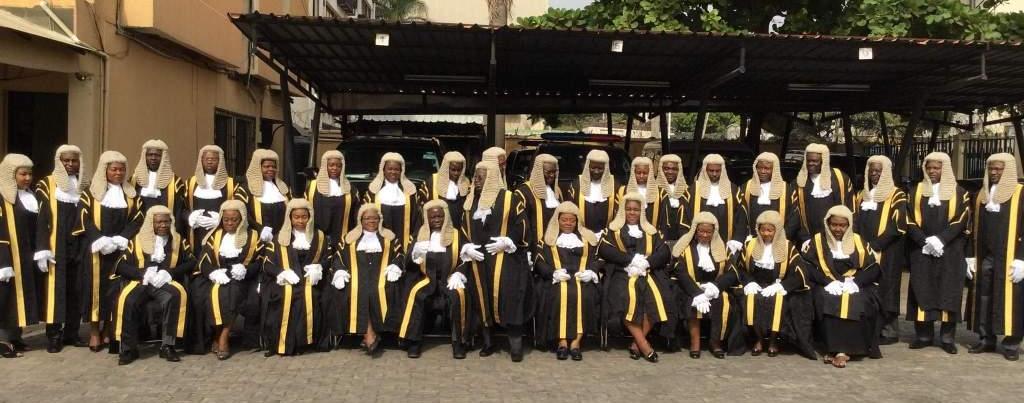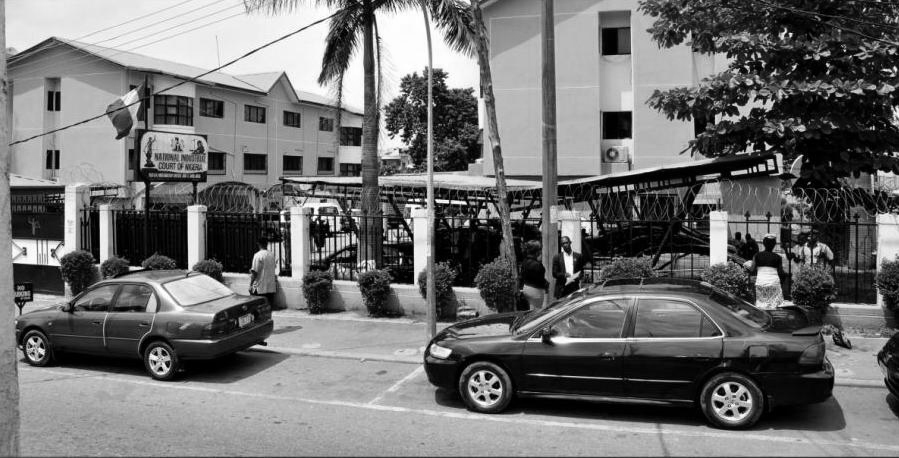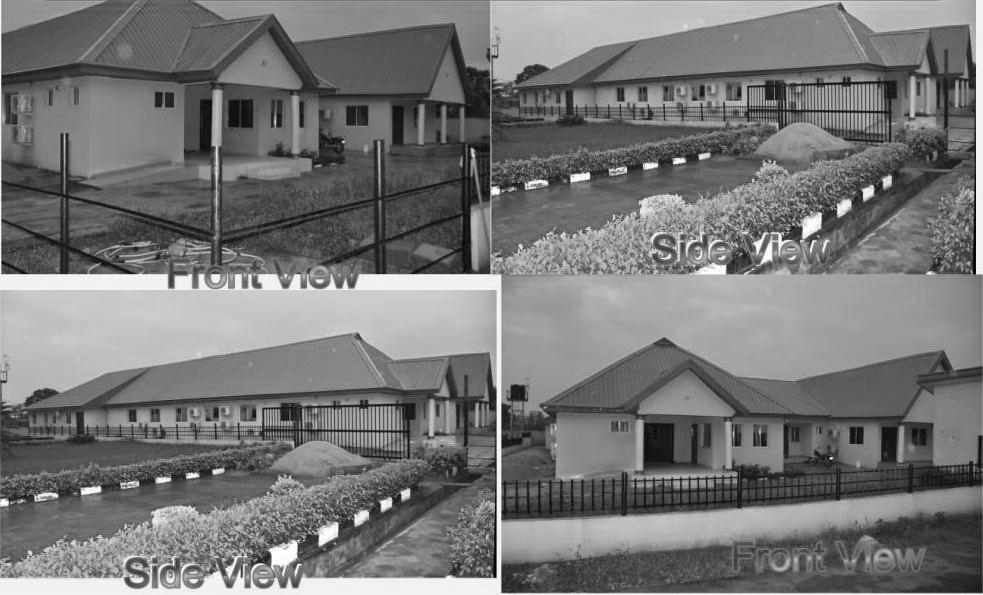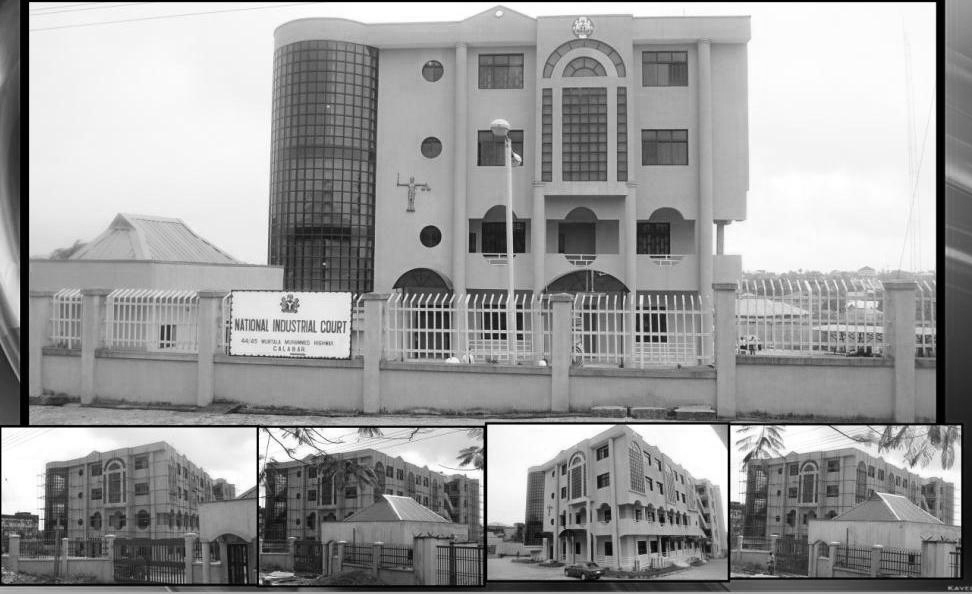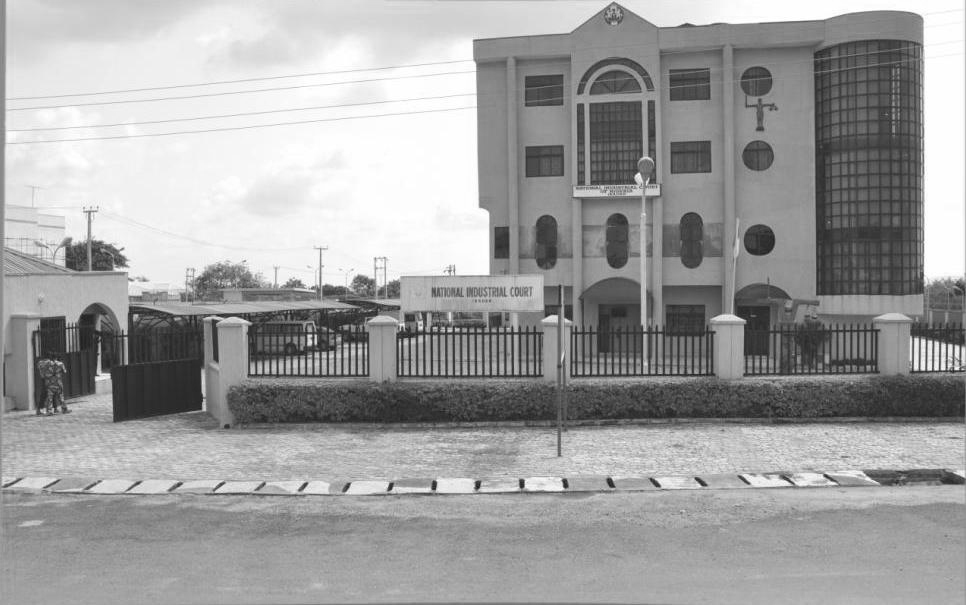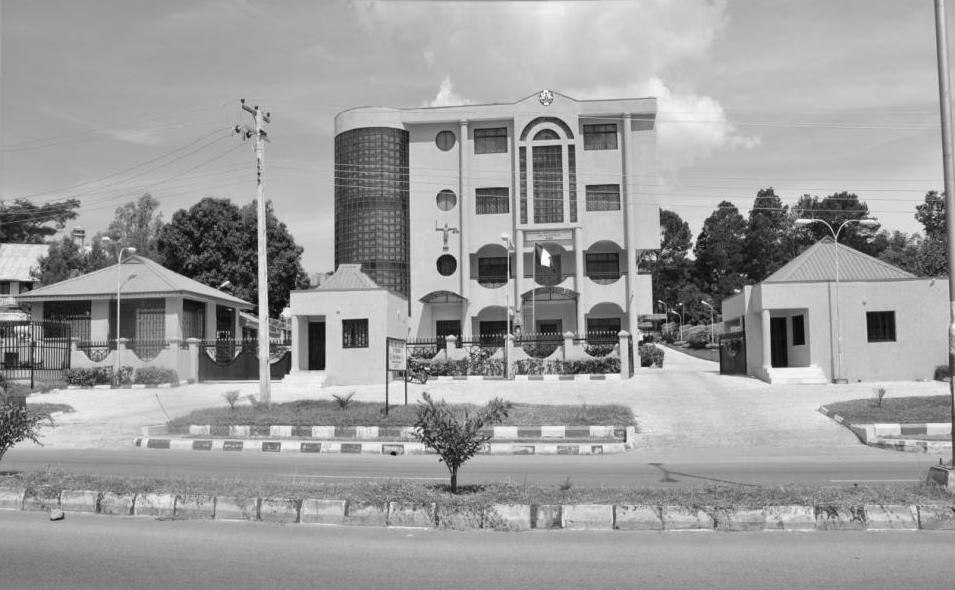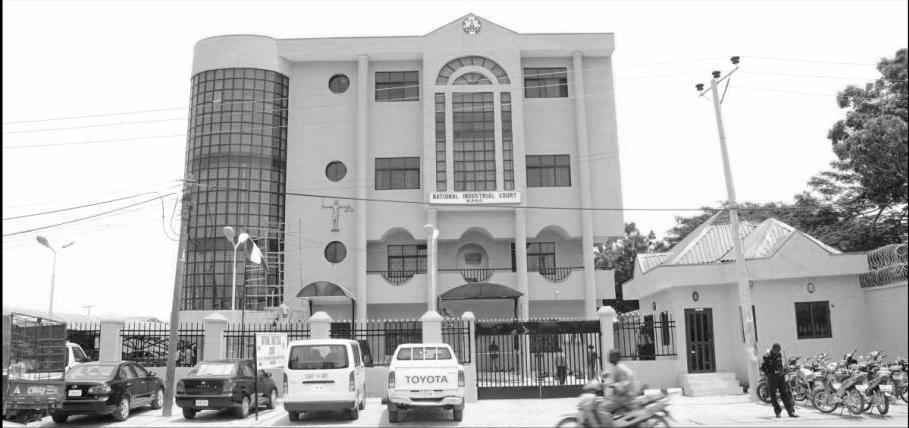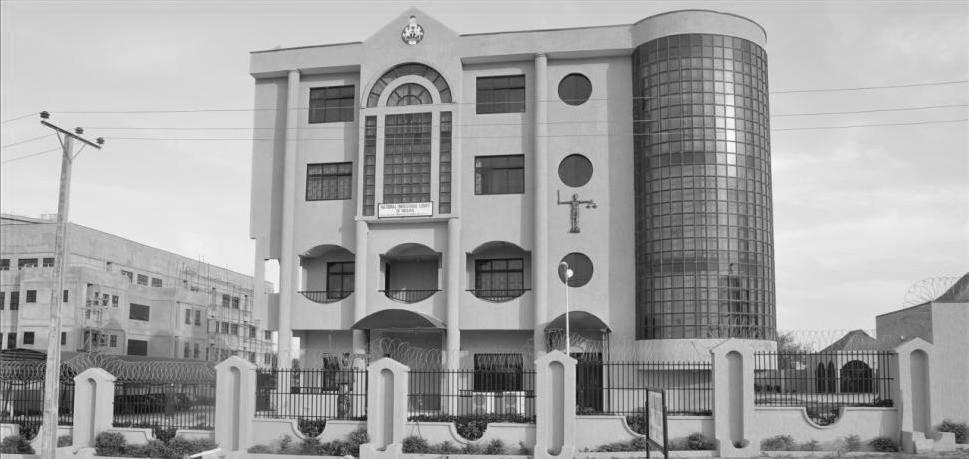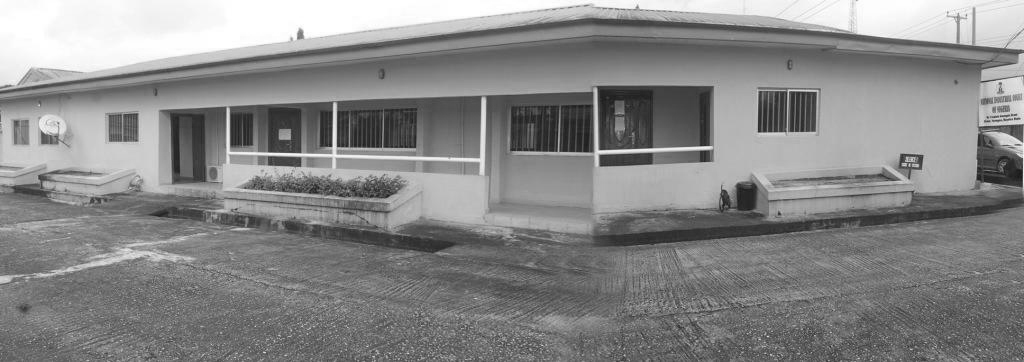The National Industrial Court of Nigeria is a specialized superior court of record of dispensing social
justice, dedicated to administering justice in an equitable impartial and timely manner.
In accordance
with the rule of law and by fostering public trust, understanding and confidence. It shall provide the public
and other agencies it serves with an accessible, safe, respectful environment in which to conduct business and resolve disputes.
National Industrial Court of Nigeria will be a court system, characterized by execellence that strives
to attain a fair and responsive system of justice while protecting the rights and liberties, upholding
and interpreting the law, and resolving disputes peacefully, fairly and effectively.
This
includes an effectively managed judiciary and judicial system that utilizes alternative dispute
resolution to best serve the public,whille seeking the highest possible understanding, trust and confidence.
At the National Industrial Court of Nigeria, we strive to provide the following;
The Court aims at promoting industrial harmony through a timely, but fair resolution of disputes arising
from industrial relations in a flexible, expedient, reliable and affordable manner thereby providing the
enabling environment for the nation’s industrial development and economic growth.
We combine the rule of law applicable in conventional courts with speedy resolution of industrial
disputes conscious of the import of economics of time on socio-economic
At the helm of affairs of the Court is the President. Section 1(2) (a) of the National
Industrial Court Act, 2006, provides that the court shall consist of the President of the court
who shall have overall control and supervision of the administration of the Court.See more
Section 2(5)
provides that if the office of the President of the court is vacant, or if the person holding the office is for any
reason unable to perform the functions of the office, then until a person has been appointed to and assumed
the functions of that office or until the person holding the office has resumed those functions, the President
(of the Federal Republic of Nigeria) shall appoint the most senior Judge of the court having the qualification to
be appointed as President of the court as provided under subsection (3) of this section to perform those functions.
Section 1(2)(b) provides that the Court shall consist of not less than twelve Judges. So, in the Judicial Cadre of
the court are the President and the Judges. There are five departments that have been created for administrative purposes.
They function under the direct supervision of the Chief Registrar of the court. Statutorily, the Chief Registrar is seised
of custody of the records of the court and exercises such other functions as are assigned to him/her by the Rules of Court
and the President who has overall control and supervision and administration of the court.
The departments of the court are as follows: Personnel; Litigation; Finance and Accounts; Procurement and Stores; and Library
PERSONNEL DEPARTMENT
Under the Personnel department are the following sections: Appointment/Promotions/Disciplinary Section, Establishment/Pensions Section;
Training and Development Section; Industrial Relations Section and Welfare Section. The functions of the Personnel Department include recruitment,
selection and placement of personnel in the court; career and performance management; reward and compensation; training and development; industrial
relations; preparation of personnel budget; retirement, disengagement and pension processes.
The actual staff strength of the court is 345 comprising
30 management staff; 75 middle level (senior) staff and 240 junior staff. The cadre of officers in the National Industrial Court include the Registrar,
Assistants Registrars, Administrative Officers, Accountants, Librarian, Medical Officers, Pharmacists, Stores Officer, Executive Officers, Engineers,
Technical Officers, Nurses, Confidential Secretaries, Library Officers, Procurement Officers, Laboratory Technologist, Estate Officers, Clerical Officers
and Typists.
Presently, the judicial officers of the court comprise the President and four Judges. Section 1(2) (b) of the National Industrial Court Act,
2006, provides that the court shall consist of not less than twelve Judges. To make the court more effective, the President of the Federal Republic of Nigeria
has approved the appointment of four additional Judges to the Court in the first instance.
Now 6 judges have been appointed to make up the minimum number required by the Act.
LITIGATION DEPARTMENT
The Litigation Department is made up of the Registry, Bailiff, Dispatch, Receiving Desk, Pending Cases,
Archives and Appeals Sections. The functions of the Litigation Department include;
- Processes of all documents filed in court by litigants which are; Complaint or originating summons or
interim application or interlocutory applications or ex parte motion or motion on
notice or witness statement on oath or any other process.
- Transmitting processes filed to the nearest judicial division for necessary action,
- Issuing hearing notices to parties or their counsel as may be required, shall comply with
the provisions of Order 7 and all the applicable provisions of the rules of this court.
- preparation of court processes and filing of same in the relevant/appropriate files for the judges’ attention and necessary action,
- Administration of oaths on litigants and witnesses in court,
- Processing of appeals,
- Preparation of record of proceedings and copies of judgments, etc.
Any officer who wrongly or mistakenly accepts any process which does not comply with the provisions of this
rules on filing, such process shall be incompetent and shall not be used for the purpose for which it is intendedSee more
Cases that come to NICN
Relating to or connected with any labor, employment, trade unions, industrial relations and matters arising from workplace,
the conditions of service, including health, safety, welfare of labor, employee, worker and matters
incidental thereto or connected therewith.
Relating to or connected with disputes arising from any strike, lock-out or any industrial action,
or any conduct in contemplation or in furtherance of a strike, lock-out, or any industrial action
and matters connected therewith or related thereto;
Relating to or connected with disputes arising from payment or non-payment of salaries, wages,
pensions, gratuities, allowances, benefits, and any other entitlement of any employee, worker,
political or public office holder, judicial officer, or any civil or public servant in any
part of the federation and matters incidental thereto and
Provisions of section 7(1)(a) and (b) of National Industrial Court Act 2006 namely matters relating
1. labor, including trade unions and industrial relations; and
2. Environment and conditions of work, health, safety and welfare of labor and matters incidental thereto
Any person or a representative of a trade union or employers’ organization who has a cause of action relating to
labour, including trade union matters or industrial relations, can file it in court for determination.
Parties to a suit are permitted to introduce relevant evidence that will help to prove to the court the truth
of their position. If the trial proceeds to a conclusion, the judge must decide which party prevails.
Once a decision is final, litigation ends. The prevailing party is then the authority to collect damages or
receive other remedies from the losing party. After the losing party provides the relief, the party is entitled
to receive from the prevailing party a satisfaction of judgement which is filed with the trial court.
The document attests to the satisfaction of all court-imposed relief and signifies the end of the case.
FINANCE AND ACCOUNTS
The Finance and Accounts department is made up of nine sections namely
Funds;
Central Pay Office;
Recurrent Expenditure;
Capital Expenditure, Checking;
Salary;
Sub-Account;
Bank Reconciliation and
Final Account Sections.
The Department processes the monthly recurrent expenditure allocations received
from the National Judicial Council to the various sub-heads of the vote book, ensures that the Court
Account on capital expenditure with the Central Bank of Nigeria is credited with quarterly allocations,
conducts checks and balances on all payment documents, prepares monthly salaries for payment to staff
through their banks, verifies contract bills, claims and other payment documents; raises payment vouchers
and issues cheques accordingly; renders monthly returns of the bank reconciliation, transcripts, returns
of expenditure, revenue returns and other information required by the office of the Accountant General of
the Federation, Auditor General of the Federation and the National Judicial Council.
PROCUREMENT DEPARTMENT
THE PUBLIC Procurement Act of 2007 established in all MDAs Procurement Department with responsibility to
perform procurement activities within an organization. It is on this premise that National industrial court
of Nigeria set up the department to carry out its mandate in line with Procurement Act 2007.
STRUCTURE OF PROCUREMENT DEPARTMENT
In national Industrial Court of Nigeria, below is the structure of the Procurement Department.
1. Procurement Planning
2. Stock verification
3. Market surveySee more
FUNCTIONS OF PROCUREMENT DEPARTMENT
- Secretariat of the Department Tenders Board;
- Dealing with all matters on procurement
- Ensuring strict adherence to all extant regulations, procedures and provisions of the Procurement Act 2007;
- Maintaining a periodic register of suppliers/ Contractors/ Services provider;
- Responsible for all tender process;
- Liaising with relevant agencies in matter relating to contract awards in respect to Procurement.
- Resolve complaints and disputes, if any.
- Execute all Contract Agreement.
- Advertise and solicit for bids in Compliance with guidelines issued by the Bureau from time to time.
LIBRARY SERVICES
The Library is an integral part of any organization and the management is doing a lot to keep up to date,
however users can ask question where they do not understand. Non-lawyer of Court employee should not remain
novice of the law environment but do everything possible to take advantage to update themselves from the enormous
resources of the library as a special university for all and sundry.
There are several activities that we currently engage in the library department in order to add values to the
services that we render for our Judges, lawyers and our entire teeming library users and some of those activities are as follows:-
To provide information materials and resources relevant to thr needs of the NICN library to both staff and legal researchers.
To provide information resources for recreation and personal self-development of our teeming clienteles;
To provide and ensure security of materials resources and staff;
To provide a conductive accommodation for study and research;
To maintain inter-Library and institutional cooperation for improves resources base and information service delivery.
E-Library: In a bid to align the operations of the library to global best practices standard, such that at a fingertip we can
have access to the book catalogues in an electronic format, and to give access to the library user’s to have a
look of the books we have in store to make lending easy for all and for that reason we have embarked on the development
of the application which will surely be ready soon. See more
The expected software will make the library user’s comfort in accessing
the robust content of our Labour law, Industrial Relations and Employment Law books from any location anywhere in the world.
By this innovation each library users are expected to create their own log in, in-order to be able to access the library via
the internet. It is also a platform of opportunity to showcase the content of our library to the rest of the world given that
we are ICT driven age we in the library cannot afford to be left behind in the new trend of things.
Electronic Law Report: these are the Robust System Automated Law Report Databases like Electronic Law Pavilion, Legalpedia,
Heinonline law Journal, Supreme Court online based resources currently available in the
Library to aid fast track or quick legal/judicial searches without delay.
Bibliographic Services: emerging compilation of information access aids such as indexes or annotated bibliography.
Photocopy Service: we have readily available photocopy machines that can assiste users in making few or relevant copies of
desired area of need researchers. This service is critical and essential to safe guide our books.
LIBRARY TARGET GOALS
- To make NICN library the best and enviable labour law library in Nigeria.
- To build a user’s friendly 24/7 electronic law library.
- To build the largest collections of labour law books ever! “both foreign and local”
- To compete favorably with international best practices.
- To build strong library institution that can provide access and assistance to informational needs of our users during and after working hours.
- To build a strong library institution worthy of emulation as well as a reference point in the judicial sector and Nigeria as a whole.
SECTIONS IN THE LIBRARY:
- Readers Service Section & Circulation
- Technical Services & Collection Development
- Serial Section
- Reprographics Services.
NICN CLINIC
The Clinic of the noble court which has Medical Practitioners, Pharmacists, Nurses, Laboratory Scientists,
Senior Health Assistants, and other Health Workers was established to cater for the health needs of all the members of staff of the Court.
- Treatment of all forms of ailments amongst the staff of the court.
- Carry out diagnostic procedures.
- Functions as advisory body on all health matters to the Court.
- Counsels Staff on proper drugs use and other drugs related matters
- Vaccination of staff members against diseases.
- Organize Clinical meeting for Health Awareness Campaigns
- Carry out every other Health functions as deemed fit by the Court.
It operates in eight (8) Divisions of the Court including Abuja,
Lagos, Kano, Enugu, Ibadan, Akure and Jos respectively.See more
MAINTENANCE DEPARTMENT
The schedule and duties of Maintenance department involves Monitoring/ Inspection/ repair/ Preventive
Maintenance and Salvaging of equipment and facilities of court.
The technical schedule includes: Electricial, Mechanical, Estate, Plumbing works and other services.
The Monitoring/ Inspection aspect involves:
- Supervision of Engineering/ Technical contract works
- Detection of building defects
- Monitoring of Court Facilities
- Safety of Equipment and Facilities of Court
- Advisory role on procurement of technical items.
- Advisory role on property matters
The department is also saddled with the responsibility of executing repairs/ maintenance of plants, office equipment and facilities of the court.
Equally, the department carries out monitoring and settlement of bills: Electricity, Water, and Solid/Liquid waste, property and services charge.
PLANNING RESEARCH AND STATISTICS DEPARTMENT
The PRS department is one of 3 new departments created in February 26th by the FJSC for the court -
with the core mandate of planning, researching and statistical analysis, as the name implies.
PLANNING SECTION
- Preparation of Annual Budget/Rolling Plan in collaboration with relevant departments [Finance & Accounts, Admin, Litigation, Procurement, Maintenance, Library, Medical Services]
- Monitoring and evaluating a progressive Quarterly and annual work plan of various departments/ units / Section of the Court.
- Developing of a work plan for a department/ Units/ sections of the court.
- Monitor the implementation of the work plan
- Keep record of approved development plan
- Providing secretariat for senior/top management meetings, evaluating and appraisal of documents, correspondence to maintain a good image of the court.
- Covering Chief registrar’s tours and meetings.
RESEARCH & STATISTICS
- Research into the operational modalities of the court.
- Coordinating and monitoring monthly, quarterly and annual report of the activities of the court.
- Oversee the preparation, collation and analyse reports and activities from other departments of the court.
- Manpower training & development – monitoring training, workshop, conferences & seminars.
INFORMATION TECHNOLOGY
- Establishment and operation of data bank {staffs data} & computer service to assist various department, units, and sections of the court.
- Management and Data Updates
- Computer Installation, internet services, network upgrades, developing applications programs that would facilitates, enhance and simplify the court/administrative activities.
- Management and Records of information
The ICT Department of the National Industrial Court have the following units:
- Man Power.
- Personnel Budget.
- ID Card Production.
- Information.


